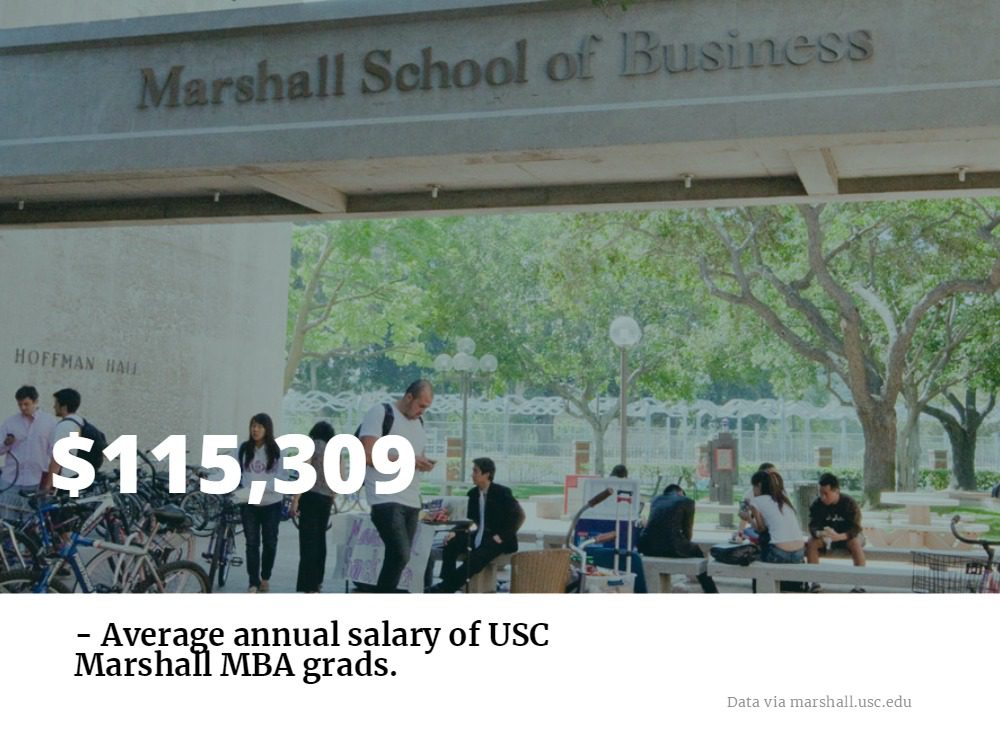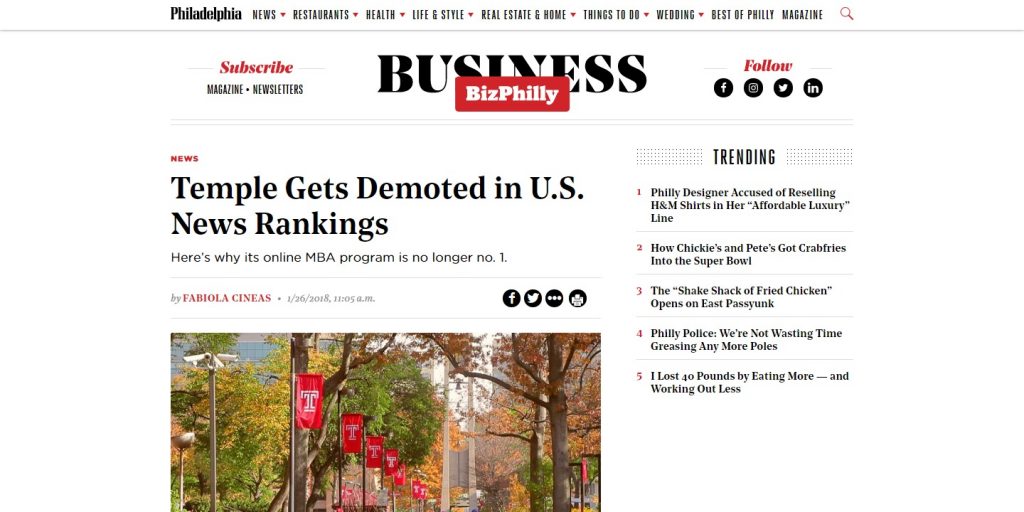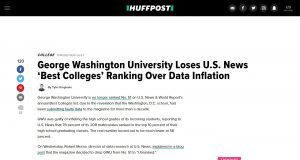Cornell FinTech Disruption, Crowd-Funding Wisdom, and More – New York News

Let’s explore some of the most interesting stories that have emerged from New York City business schools this week.
Fintech is Disrupting the Disruptors, and We’re Ready For It – Johnson School of Management Blog
S.C. Johnson Graduate School of Management MBA candidate Arjun Devgan, ’18, highlighted how FinTech inventions such as cryptocurrencies, peer-to-peer lending, and smart insurance have begun to disrupt a post-PayPal landscape, which at one point disrupted traditional banking.
Devgan writes about two Cornell Tech intensives designed to “equip students to solve business problems in this age of digital transformation:” the digital marketing intensive and the fintech intensive.
“With my background in payments and remittances, the fintech intensive program offered me a launchpad to dive deep into the world of financial technology. Classes such as the Fintech Practicum, Business Models, Cryptocurrencies, and a Field Project with one of Citi Ventures’ portfolio companies offer a great combination of basic theoretical concepts and real-world experiential learning.”
Learn more about Johnson’s FinTech and Digital Marketing Intensives here.
Want People to Fund your Kickstarter Project? Sell Them on Your Reputation First – Binghamton School of Management Blog
Binghamton School of Management associate professor Ali Alper Yayla presented a new paper at the 51st Hawaii International Conference on System Sciences, which found that potential Kickstarter backers are more concerned about a producer’s “ethical characteristics than their actual ability to make and deliver the product.” Professor Yayla writes:
“We found that people worry more about the seller’s honesty than whether the seller actually has the ability and knowledge to finish and deliver on the product. People don’t want sellers to just take their money and run. Crowdfunding is interesting because you’re literally buying something that isn’t finished from a person who has never made it before. There are no product reviews, and there are no seller reviews.”
Read more about Yayla’s research here.
Can Mark Zuckerberg Fix Facebook’s Mess? – Forbes
In Len Sherman’s recent Forbes article “Can Mark Zuckerberg Fix Facebook’s Mess?”, the Columbia Business School executive in residence and adjunct professor noted the company’s seemingly astounding naivety of how much information was secretly (or not so secretly) being scrubbed for use by third party companies like Cambridge Analytica.
“It’s been hard to fathom how a company reputed to be run by one of the world’s most brilliant digirati, could have been so naïve in not recognizing the risks in giving outside developers broad access to Facebook’s user data, so lax in failing to ensure that rogue data in malevolent hands was destroyed before it could be weaponized, and so reluctant to advise users that their personal information was (and still is) floating around cyberspace. In short, what was Mark Zuckerberg thinking?”
Sherman theorizes that part of the issue is Zuckerberg’s sincere overconfidence that technology and innovation can only be used for a greater good, rather than being possibly manipulated by less-than-ideal forces. This, Sherman continues, was all done despite a litany of data that proved Facebook’s nefarious actors and less-than-strict partnerships were actively making the platform less safe year by year.
Click here to see the rest of Sherman’s work with Forbes.
Rotman Prof Talks Theranos Fraud, and More – Toronto News

People affiliated with Toronto‘s finest business schools have been making the news. Below, we’ve laid out some of this week’s highlights.
How Board Diversity Might Have Prevented the Theranos Fiasco – The Globe & Mail
Andras Tilcsik, Canada Research Chair in strategy, organizations, and society at the University of Toronto’s Rotman School of Management coauthored an opinion piece in The Globe & Mail with Chris Clearfield, Principal at System Logic. The article addressed the fraud charges lodged against Theranos founder Elizabeth Holmes.
Holmes, who was listed as one of Forbes’ “Youngest Self-Made Billionaires” has been charged with “massive” fraud involving upwards of $700 million USD. Holmes has agreed to cede control of her company, which was boating more innovated methods of blood-testing to potential investors.
Tilcsik and Clearfield argue that Holmes’s mistakes might have been prevented had a systemic problem in businesses been addressed at Theranos: board diversity. All but two Theranos board members were white men over 60. According to the article, “… lab experiments show that while homogeneous groups do less well on complex tasks, they report feeling more confident about their decisions.”

Holmes’ equity stake in Theranos, the notorious blood-testing startup she founded, has been reduced to virtually nothing after being charged with large-scale fraud from the SEC.
Learn more about the importance of board diversity here.
YouTube Star Choreographs a Career Blending Bollywood and Business – The Globe & Mail
Shareen Ladha, graduate of York University’s Schulich School of Business, used her MBA to guide her in an unconventional career goal. She wanted to build success producing and dancing in Bollywood-esq videos on YouTube, achieving massive momentum when she did a Bollywood-style remix of Justin Bieber’s “Sorry.” The video quickly went viral, and now Ladha balances making YouTube videos with her career as a senior strategist with McCann.
“Through my MBA, I decided that this was the thing that made me unique and it was proof I could bring a creative aspect to strategy and consulting,” Ladha said in a recent profile with the Globe & Mail.
“It started getting woven into my daily life and daily conversations I would have with people. All my social media accounts were public, so if they ever looked me up or were friends with me, they’d know about it. There was such a positive response.”
You can read more about the YouTube star here.
Ivey Students Learn the Three Gs of Good Investing – News@Ivey
Multi-billion dollar Brazilian investment firm 3G Capital Management recently let students at the Ivey Business School at Western University Canada in on a simple secret: the three Gs to successful investing are “good business, good management, and good price.”
3G managing partner Pavel Begun spoke with professor George Athanassakos and his value investing class last month, further explaining what each of those three Gs (get it?) meant:
Good Business:
“’We define good business as one that is competitively entrenched, generates high return of invested capital and is in solid financial shape.’” Specifically, 3G looks at businesses that are industry leaders and show industry longevity in order to predict their future value. They also look to businesses that generate with ROEs, or return on equity, of 15 per cent and above. Finally, they look at the debt payback period of business to ensure it is no greater than three to five years, helping to determine their financial shape.”
To read the rest of the advice gifted from Begun, click here.
What Toronto MBA Can You Earn in the Least Amount of Time? – MetroMBA
Several of the most well-regarded business schools in Toronto offer MBA programs that do not take the typical two-years that a traditional full-time degree often requires.
For instance, the DeGroote School of Business at McMaster University has an accelerated program that takes just eight months to complete. Alanna Shaffer further explains:
“By exempting students from the required first year MBA courses, students can earn their degree quickly while also cutting their overall tuition expenses in half and accelerating their path to employment. The program is designed for students who have earned their undergraduate business degree in the last ten years, and have at least one year of professional experience. Students may start the program in either September or January.”
Check up on the rest of the fastest MBA programs in Toronto here.
The Best Long Angeles MBA Return on Investment Bets

Return on Investment (ROI) is one of the most important factors a prospective MBA can take into consideration when choosing the right business school.
Of course, the true value of each MBA program may ultimately be something impossible to measure. The kind of connections made through professional networking, the soft skills that students attain which help them navigate through both their personal and professional life—these aren’t things that can be easily quantified. But, thankfully, factors like average salary increase, rate of post-graduate employment and the overall tuition of a program are. And these numbers can help students start to better see an overall picture of what each MBA is worth.
The Best Long Angeles MBA Return on Investment
The Marshall School of Business – USC
The Marshall School of Business at the University of Southern California is consistently one of the top ranked MBA programs in the state of California and even throughout the country. Specific ROI aside, these sorts of honors should also be a factor when considering the overall value of the program: for example, Marshall has been named the third best program for “Most Satisfied Business School Graduates” by Forbes and sixth on The Economist’s ranking of “Best Alumni Networks.”
Based on tuition for the 2017-18 school year, the total expense (tuition, fees and living expenses included) to pursue a full-time MBA at Marshall would be $95,881 for the first year and $82,522 for the second, for a total of $178,403.
Now take into consideration the fact that the average salary for graduates of Marshall’s full-time MBA program within three months of graduation is $115,309, and that the large majority of job offers (38 percent) for MBA students came from on-campus recruiting or job postings through the university. The second highest source of employment (21 percent) came from internships held while in the MBA program. Furthermore, a number of top organizations—such as Apple, AT&T, and Walt Disney Studios—hired the graduates of Marshall’s 2016 MBA class. All of these factors boost the overall ROI of Marshall’s program, making it one of the top valued programs in L.A.—even with the high price tag.

Anderson School of Management – UCLA
The Anderson School of Management at UCLA is another program which offers a high ROI when considering the types of opportunities and salaries available to students after graduation. While the tuition cost is certainly high—roughly $194,220 (including fees and living expenses) for the the two years of the program, the benefits to students are undeniable.
A look at the full-time employment report for the most recent MBA class finds that 92.4 percent of students were offered full-time employment within just three months of graduation, with 87.7 percent acceptances. By far (72.2 percent) , students found their employment opportunities through Anderson-facilitated resources, such as internships, on-campus recruiting, or from UCLA Anderson alumni and classmates.
The salaries for graduating Anderson students also reveals a positive trend: the average post-graduate compensation was $118,150, with 70.6 percent of students earning signing bonuses of up to $89,500. The connections sewn by Anderson internships and alumnae also reveal a significant payoff in the types of organizations hiring Anderson alum: companies like NBC Universal, IBM, Barclays, Google, and other major corporations now have Anderson MBA graduates on staff.
The Paul Merage School of Business – University of California, Irvine
The UC Irvine Paul Merage School of Business is one of the top business schools in the Los Angeles metro area, as evidenced by its consistently high rankings from various publications, such as the Financial Times and U.S. News & World Report.
With the program’s recognition for its high lifetime earnings combined with the relatively low cost the degree, it’s no surprise that that the program at UC Irvine produces a high return on investment. The estimated total annual cost of an MBA at Merage ranges from $67,422—$83,967, depending on if you whether or not you are a resident of California and whether or not you will be using campus. This is compared with an average post-graduate salary of $97,808 for the 2017 graduating class. About 50 percent of all students were employed by graduation, and 81 percent held full-time jobs within three months.
Graziado School of Business and Management – Pepperdine University
One of the reasons Pepperdine’s Graziado School of Business boasts such a high return on investment is the many different formats in which students can pursue a full-time degree. With the opportunity to take the full-time MBA over the course of 12, 15, or 20 months, the Graziado MBA typically costs less overall ($74,250 for the 12-month program, $99,000 for all others) and means less time away from a full-time paycheck.
Combine this with the success rate of 82 percent of students accepting job within three months after graduation and a $120,000 starting salary (at highest), and its understandable why Graziado graduates find incredible value in their degree.
Philly News: UD Promotes Gender Equity and More

Let’s visit some of the biggest news coming out of Philadelphia business schools this week.
LeBow Students Help Dow Chemical Use Customer Feedback—Technical.ly Philly
Teams of students and faculty at Drexel University’s LeBow College of Business are on a mission to help companies utilize massive amounts of untapped data. Recently, LeBow students have been helping university partner Dow Chemical in a quest to glean insight into consumers’ responses to products.
According to the project’s supervisor, Professor of MiS Murugan Anandarajan, “Our students not only extract, clean and explore data—they also derive valuable insights that can be used to make decisions. Students transform data points to convey potential strategies that companies should implement.”
Using online reviews of Dow products, students created an interactive dashboard to map out patterns in reviews. With an accessible map of this data, the company can easily use trends in consumer feedback to improve its products and marketing.
Read more about LeBow’s work with Dow Chemical here.
Lerner College to Host Women’s Leadership Initiative Launch—Delaware Business Now
The World Economic Forum predicts that it will take 158 years to reach true gender equality in North America alone. Luckily, schools like University of Delaware’s Alfred Lerner College of Business and Economics are committed to promoting gender equity now. In fact, this International Women’s Day, Lerner is hosting the Women’s Leadership Initiative Launch at the Roselle Center for the Arts.
According to UD’s website, the Women’s Leadership Initiative (WLI), “… is the preeminent driver of learning to propel transformational women leaders and advance gender equity in the workplace.”
The free event at the Roselle Center will feature prominent alumni speakers like Terri Kelly, president and CEO of W.L. Gore and Associates, Inc., Mary Ellen Payne, former VP of sales and marketing at Verizon Communications, and several others.
Read more about the Women’s Leadership Initiative Launch here.
Wharton Professor Claims Brainstorming Meetings Stifle Creativity—CNBC
In a recent interview with Amazon, Adam Grant, famed author and professor at The Wharton School at University of Pennsylvania, detailed the flaws with using brainstorming meetings to find creative solutions. According to Grant, bringing colleagues together to think out loud is a surefire way to limit the scope of their ideas. Shyer or less assertive members of the team may go unheard, fear of embarrassment may make others “play it safe” by expressing only their most conventional ideas, or the members of the group may fall into convergent thinking, wherein the majority of people support one idea and less popular suggestions fizzle out.
Grant promotes having everyone write out their ideas before sharing them. In fact, Grant says that the way to reach maximum creativity is to write out 200 ideas. Grant, organizational psychologist, has authored several books and was recently named to Fortune’s 40 Under 40 list.
Read more about Adam Grants views of creativity in business here, and check out the Amazon video below.
Caught: Why Business Schools Might Lie to Improve Rankings

School rankings from sites like Forbes or U.S. News & World Report are often a crucial factor for students before they decide where they should pursue a degree. Using a combination of rankings, standardized test scores, job placement after graduation, and tuition costs, among other crucial factors, a school ranking a quick and succinct look at the relative merits and weaknesses of MBA programs throughout the country—and the world.
There is a lot riding on these rankings: not only do perspective MBAs often make decisions about where to pursue their degree based on these reviews, but graduates can use these rankings to demonstrate the quality of their degree to future employers. With such high stakes, organizations like U.S. News that compile these rankings rely on the accurate reporting of data from each business school.
So, what happens if the information is inaccurate, or worse? Data like student satisfaction and post-graduate salary—which can be so crucial in informing a prospective MBAs choice of school or program—is reported directly from the business schools, which often presents a conflict of interest potential. With so much at stake, would a school ever lie to increase their spot in the ranking?
Unfortunately, it seems the answer is yes. Just last week, the Online MBA program at Temple University’s Fox School of Business—a program that was consistently ranked in the top spot in U.S. News’ Online MBA ranking—vanished from the list. According to the initial announcement, new information had revealed that just 20 percent of Fox students in the Online MBA program had actually submitted test scores, a number that had initially been reported at a perfect 100 percent. Since the formula used by U.S. News weighs test score averages more if over 75 percent of students have submitted them, this inaccurate reporting from Temple Fox would have given the program an undeserved boost in the school ranking.

In the wake of Temple’s removal, questions continue to arise about the lengths schools go for good rankings/Photo via PhillyMag.
In the days since the initial announcement of Temple’s removal from the ranking, even more questions came out regarding the accuracy of Fox’s data. Further investigation found that Temple had reported 100 percent of students taking standardized admissions test for every year since 2014—a suspicious jump from the 25 and 33 percent that had been reported in the years prior. Since the test scores data submitted turned out to be inaccurate, it seems wholly possible that the data had also been misreported for the three years prior; the same years that Temple Fox held the top ranking for Online MBA programs.
This isn’t the first time it’s been discovered that business schools and even undergraduate programs have falsified or reported inaccurate data to boost its rankings. In 2013, Forbes was forced to remove four schools from its ranking of “America’s Best Colleges” due to inaccurate reporting: doctored SAT results from Bucknell University, false acceptance and graduation rates from Iona College, among others. In 2012, George Washington University lost its ranking on U.S. News’ “Best Colleges” list when it was discovered they were inflating the high school grades of their incoming students.

GWU was one of several schools in the past few years to submit false data for a rankings boost/via Huffington Post.
The problem may be even more far-reaching than some may suspect. In 2013, a survey of 576 college admissions officers found that 91 percent believed other colleges to be guilty of falsely reporting their admissions data. Even the school ranking creators themselves are shocked by this trend. In 2013, U.S. News editor Brian Kelly commented, “The integrity of data is important to everybody … I find it incredible to contemplate that institutions based on ethical behavior would be doing this.”
In 2005, the Association to Advance Collegiate School of Business (AACSB) took a deep look into this trend to examine why the issue of falsifying business school data might be so widespread. “Because rankings of full-time MBA programs are commonly presented under the label of ‘best b-schools,’ the public has developed a narrow definition about the breadth and value of business education,” the report states. Since most media rankings don’t consider factors like faculty research or doctoral education, MBA programs have become more likely to invest in more visible aspects of the program, such as facilities and marketing campaigns, which don’t actually deal with the quality of the degree. As a result, even high-quality programs may earn a lower media rank than they deserve based on the factors considered, adding pressure to do what it takes to earn a school ranking that matches what they perceive as the quality of the degree.
“Plenty of people apply to a school because it has reached the summit of a ‘best-of’ ranking, just as many people will see a movie or buy a book after it wins an award. That’s human nature,” Columbia Business School dean Glenn Hubbard told Fortune. “We want to experience the best.”
Whether or not placement in a school ranking truly represents the quality of a degree, it’s easy to see why the pressure is on for many admissions departments. A better school ranking can increase the number of applicants, providing for a more competitive, and diverse applicant pool, which creates a better quality admitted class. The cycle continues: success of these graduates can improve the possibility of future funding, providing more resources for the program and encouraging even more applicants to apply down the line.
“Rankings have become omnipresent in higher education, and they have enhanced the competition among institutions,” said Terry W. Hartle, senior vice president at the American Council on Education, in 2013. “And in any highly competitive environment, there is always a temptation to cut corners.”
For now, the Fox School of Business has been removed from the U.S. News Online MBA ranking. Concerns about false data continue to be evaluated, as organizations like AACSB continue to seek solutions and make recommendations for best practices when it comes to the collection and reporting of admissions data. In 2017, the AACSB publication “On Academic Rankings, Unacceptable Methods, and the Social Obligations of Business Schools,” suggested that schools and organizing bodies work together to find a method of data collection that includes “transparency, interpretability, and the empowerment of individual decision makers by whatever criteria truly suits their individual needs.”
For prospective students, its important to acknowledge this troubling but widespread trend as they make important decisions about where to earn a degree. While school ranking remains an easy way to compare programs against each other, students should consider not just the accuracy of the data but also the kind of factors reported in media rankings. While it seems possible that the number one program in a media ranking may not truly deserve that position, the real top program- the best for each individual’s needs and career goals—will always deserve first place.
10 Networking Skills You Need to Know, from this Saint Joseph’s Professor

Marc Kramer, author and executive in residence at Saint Joseph’s Haub School of Business, recently wrote an article for BizJournals.com called, “Ten Steps to Better Networking.” Kramer’s article offered important tips for building valuable relationships and alliances in any situation. Some of the advice was more intuitive, for example, the first tip was, “Look professional and well groomed.” However, suggesting that networkers wear a unique article of clothing that could be a conversation piece was less standard. Kramer cited his own “conversation-starter ties” as an example of this sort of business posturing.
Kramer also recommended that networkers never begin a conversation by talking about themselves.
“Always introduce yourself and then ask the person for their name and what they do,” Kramer said. “Most everyone is comfortable talking about themselves.” Meeting as many people as possible was of paramount importance to Kramer, who said that at networking functions, he tries to get at least 10 business cards per hour. Having so many people’s cards can get confusing later, which is why Kramer advised readers to jot some notes down on each person’s business card right away. Kramer’s final tip was to write to each person within 24-48 hours of meeting them.

Haub Professor Marc Kramer
“Send a short email that tells them that your were please to meet them, where you met and ask the person how you can help them.,” Kramers said of writing follow-up emails, adding, “Don’t ask for anything.”
Kramer’s background as a businessman and entrepreneur made him an ideal person to offer advice on networking. He pioneered the original investor angel network (the Private Investors Forum, formerly the Pennsylvania Private Investors Group), as well as a variety of other organizations, such as the Eastern Technology Council and Kramer Communications. In addition to his entrepreneurial work and current position at Haub School of Business, Kramer has authored six books, instructed at the Wharton School, and contributed articles popular publications like Forbes.
